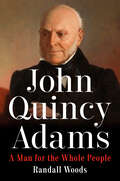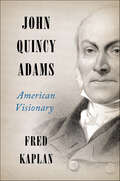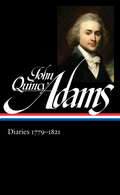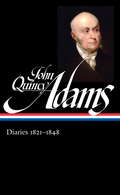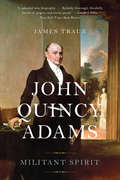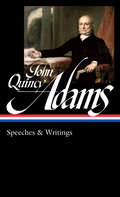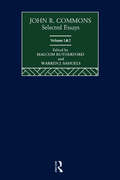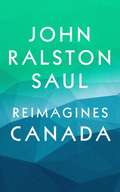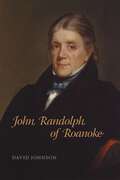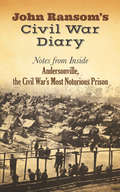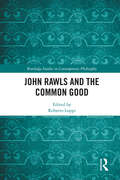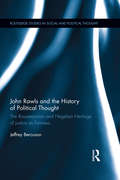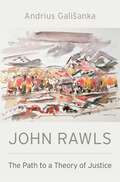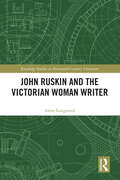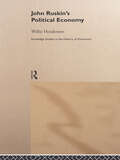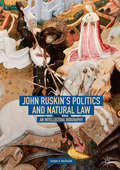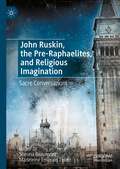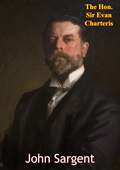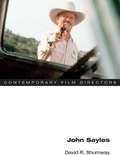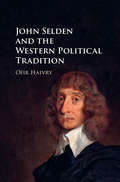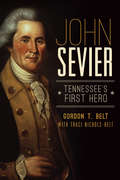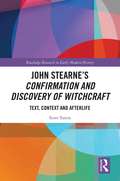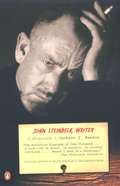- Table View
- List View
John Quincy Adams: A Man for the Whole People
by Randall WoodsA magisterial journey through the epic life and transformative times of John Quincy AdamsIn this masterful biography, historian Randall B. Woods peels back the many layers of John Quincy&’s long life, exposing a rich and complicated family saga and a political legacy that transformed the American Republic.Born the first son of John and Abigail Adams, he was pressured to follow in his father&’s footsteps in both law and politics. His boyhood was spent amid the furor of the American Revolution, and as a teen he assisted his father on diplomatic missions in Europe, hobnobbing with monarchs and statesmen, dining with Ben Franklin, sitting by Voltaire at the opera. He received a world-class education, becoming fluent in Latin, Greek, German, and French. His astonishing intellect and poise would lead to a diplomatic career of his own, in which he'd help solidify his fledgling nation&’s standing in the world.He was intertwined with every famous American of his day, from Washington to Jefferson, Madison and Monroe, Jackson, Calhoun, Clay, and Webster. He was on stage, frequently front and center, during the Revolutionary Era, the fractious birth of American party politics, the War of 1812, the Era of Good Feelings, and the peak of Continental Expansion. It was against this backdrop that he served as an ambassador, senator, secretary of state, and, unhappily, as president. The driving force behind both the Transcontinental Treaty and the Monroe Doctrine, this champion of Manifest Destiny spent the last years of his life fighting against the annexation of Texas because it would facilitate the spread of slavery.This deeply researched, brilliantly written volume delves into John Quincy&’s intellectual pursuits and political thought; his loving, yet at times strained, marriage to Louisa Catherine Johnson, whom he met in London; his troubling relationships with his three sons; and his fiery post-presidency rebirth in Congress as he became the chamber&’s most vocal opponent of slavery.
John Quincy Adams: American Visionary
by Fred Kaplan“There is much to praise in this extensively researched book, which is certainly one of the finest biographies of a sadly underrated man. . . . [Kaplan is] a master historian and biographer. . . . If he could read this biography, Adams would be satisfied that he had been fairly dealt with at last.” —Carol Berkin, Washington PostIn this fresh and illuminating biography, Fred Kaplan, the acclaimed author of Lincoln, brings into focus the dramatic life of John Quincy Adams—the little-known and much-misunderstood sixth president of the United States and the first son of John and Abigail Adams—and reveals how Adams' inspiring, progressive vision guided his life and helped shape the course of America.Kaplan draws on a trove of unpublished archival material to trace Adams' evolution from his childhood during the Revolutionary War to his brilliant years as Secretary of State to his time in the White House and beyond. He examines Adams' myriad sides: the public and private man, the statesman and writer, the wise thinker and passionate advocate, the leading abolitionist and fervent federalist. In these ways, Adams was a predecessor of Lincoln and, later, FDR and Obama. This sweeping biography makes clear how Adams' forward-thinking values, his definition of leadership, and his vision for the nation's future is as much about twenty-first-century America as it is about Adams' own time.Meticulously researched and masterfully written, John Quincy Adams paints a rich portrait of this brilliant leader and his vision for a young nation.
John Quincy Adams: Diaries 1779-1821 (Library of America Adams Family Collection #5)
by John Quincy AdamsA landmark edition of an American masterpiece: the incomparable self-portrait of John Quincy Adams and his times from the Revolution to the coming of the Civil WarThe diary of John Quincy Adams is one of the most extraordinary works in American literature. Begun in 1779 at the age of twelve and kept more or less faithfully until his death almost 70 years later, and totaling some fifteen thousand closely-written manuscript pages, it is both an unrivaled record of historical events and personalities from the nation's founding to the antebellum era and a masterpiece of American self-portraiture, tracing the spiritual, literary, and scientific interests of an exceptionally lively mind. Now, for the 250th anniversary of Adams's birth, Library of America and historian David Waldstreicher present a two-volume reader's edition of diary selections based for the first time on the original manuscripts, restoring personal and revealing passages suppressed in earlier editions.Volume I begins during the American Revolution, with Adams's first entry, as he prepares to embark on a perilous wartime voyage to Europe with his father, diplomat John Adams, and records his early impressions of Franklin and Jefferson and of Paris on the eve of revolution; it details his abbreviated but eventful years of study at Harvard and his emergence into the world of politics in his own right, as American minister to the Netherlands and to Prussia, and then as a U. S. senator from Massachusetts; and it reveals a young man at war with his passions, before finding love with the remarkable Louisa Catherine Johnson. In passages that form a kind of real-world War and Peace, the diary follows the young married couple to St. Petersburg, where as U.S. minister Adams is a witness to Napoleon's invasion of Russia. Its account of the negotiations at Ghent to end the War of 1812, where Adams leads the American delegation, is the perhaps the most detailed and dramatic picture of a diplomatic confrontation ever recorded. Volume 1 concludes with his elevation as Secretary of State under James Monroe, as he takes the fore in a fractious cabinet and emerges as the principal architect of what will become known as the Monroe Doctrine.
John Quincy Adams: Diaries 1821-1848 (Library of America Adams Family Collection #6)
by John Quincy AdamsA landmark new selected edition of an American masterpiece: the incomparable self-portrait of a man and his times from the Revolution to the coming of the Civil War The diary of John Quincy Adams is one of the most extraordinary works in American literature. Begun in 1779 at the age of twelve and kept more or less faithfully until his death almost 70 years later, and totaling some fifteen thousand closely-written manuscript pages, it is both an unrivaled record of historical events and personalities from the nation's founding to the antebellum era and a masterpiece of American self-portraiture, tracing the spiritual, literary, and scientific interests of an exceptionally lively mind. Now, for the 250th anniversary of Adams's birth, Library of America and historian David Waldstreicher present a two-volume reader's edition of diary selections based for the first time on the original manuscripts, restoring personal and revealing passages suppressed in earlier editions. Volume 2 opens with Adams serving as Secretary of State, amid political maneuverings within and outside James Monroe's cabinet to become his successor, a process that culminates in Adams's election to the presidency by the House of Representatives after the deadlocked four-way contest of 1824. Even as Adams takes the oath of office, rivals Henry Clay, his Secretary of State, John C. Calhoun, his vice president, and an embittered Andrew Jackson, eye the election of 1828. The diary records in candid detail his frustration as his far-sighted agenda for national improvement founders on the rocks of internecine political factionalism, conflict that results in his becoming only the second president, with his father, to fail to secure reelection. After a short-lived retirement, Adams returns to public service as a Congressman from Massachusetts, and for the last seventeen years of his life he leads efforts to resist the extension of slavery and to end the notorious "gag rule" that stifles debate on the issue in Congress. In 1841 he further burnishes his reputation as a scourge of the Slave Power by successfully defending African mutineers of the slave ship Amistad before the Supreme Court. The diary achieves perhaps its greatest force in its prescient anticipation of the Civil War and Emancipation, an &“object,&” as Adams described it during the Missouri Crisis, &“vast in its compass, awful in its prospects, sublime and beautiful in its issue.&”
John Quincy Adams: Militant Spirit
by James TraubA penetrating, lyrical biography of John Quincy Adams, the President and politician whose experiences spanned--and shaped--the most critical period in our nation’s history
John Quincy Adams: Speeches & Writings (LOA #390)
by John Quincy Adams21 essential works trace a great statesman&’s lifelong engagement with the promise of America and the legacy of the Founding Fathers&“Few presidents ever thought about words as carefully as John Quincy Adams. Thankfully, we can now hear his words again, in this instantly essential volume.&”—Ted Widmer, historian and former presidential speechwriterJohn Quincy Adams was one of the most accomplished American statesmen of his or any era. He brought all his eloquence, erudition, and fierce energy to bear on the politics of the nation over the course of a remarkable career that spanned from the founding era to the sectional crisis that preceded the Civil War.Despite a persistent interest in this pivotal figure, there has never been a single-volume collection of Adams&’s essential political writings, until now. Here, for the first time in an edition for general readers and students alike, are the profound insights of a far-seeing political leader who was also a consummate American stylist. From his prophetic college commencement address in 1787 to his vigorous denunciation of slavery in 1843, this Library of America volume offers a compact and compelling record of America's fractious evolution as a democratic republic, presenting some of the most important political writings in our history.These writings are more urgently needed than ever. In the words of biographer Fred Kaplan: &“His values, his definition of leadership, and his vision for the nation&’s future—particularly the difficulty of transforming vision into reality in a country that often appears ungovernable—are as much about twenty-first century America as about Adams&’ life and times.&”
John R. Commons: Selected Essays
by Malcolm Rutherford Warren J. SamuelsJohn R. Commons is one of the most significant figures in the development of American economics. One of the founders of the Institutional school, Commons developed theories of the evolution of capitalism and of institutional change which continue to influence modern economics. These volumes collect, for the first time, his major essays and articles.
John R. Commons: Selected Essays
by Malcolm Rutherford Warren J. SamuelsJohn R. Commons is one of the most significant figures in the development of American economics. One of the founders of the Institutional school, Commons developed theories of the evolution of capitalism and of institutional change which continue to influence modern economics. These volumes collect, for the first time, his major essays and articles.
John Ralston Saul Reimagines Canada (4-Book Bundle): Reflections of a Siamese Twin, A Fair Country, The Comeback, Louis-Hippolyte LaFontaine and Robert Baldwin
by John Ralston SaulCanada has no greater interpreter and champion than John Ralston Saul, who for years has been challenging our common notions of Canada. These four books examine our history and myths, our relationships and modern reality, and together brilliantly portray a unique and remarkable country. Reflections of a Siamese Twin In Reflections of a Siamese Twin, Saul turns his eye to an examination of Canada itself. Caught up in crises—political, economic, and social—Canada continues to flounder, unable to solve or even really identify its problems. Instead, we assert absolute differences between ourselves: we are English or we are French; Natives or Europeans; early immigrants or newly arrived; from the east or from the west. Or we bow to ideologies and deny all differences in the name of nationalism, unity, or equality. In a startling exercise in reorientation, John Ralston Saul makes sense of Canadian myths—real, false, denied—and reconciles them with the reality of today’s politics, culture, and economics. A Fair Country In this startlingly original vision of Canada, John Ralston Saul argues that Canada is a Métis nation, heavily influenced and shaped by Aboriginal ideas: Egalitarianism, a proper balance between individual and group, and a penchant for negotiation over violence are all Aboriginal values that Canada absorbed. An obstacle to our progress, Saul argues, is that Canada has an increasingly ineffective elite, a colonial non-intellectual business elite that doesn’t believe in Canada. It is critical that we recognize these aspects of the country in order to rethink its future. The Comeback Historic moments are always uncomfortable, Saul writes in this impassioned argument, calling on all of us to embrace and support the comeback of Aboriginal peoples. This, he says, is the great issue of our time—the most important missing piece in the building of Canada. The events that began late in 2012 with the Idle No More movement were not just a rough patch in Aboriginal relations with the rest of Canada. What is happening between Aboriginals and non-Aboriginals is not about guilt or sympathy or failure or romanticization of the past. It is about citizens’ rights. It is about rebuilding relationships that were central to the creation of Canada. These relationships are just as important to its continued existence. Wide in scope but piercing in detail, The Comeback presents a powerful portrait of modern Aboriginal life in Canada illustrated by a remarkable selection of letters, speeches, and writings by Aboriginal leaders and thinkers, showcasing the extraordinarily rich, moving, and stable indigenous point of view across the centuries. Louis-Hippolyte LaFontaine and Robert Baldwin Here, Saul argues that modern Canada did not begin in 1867; rather its foundation was laid years earlier by two visionary men, Louis-Hipplyte LaFontaine and Robert Baldwin. Opposites in temperament and driven by intense experiences of love and tragedy, together they developed principles and programs that would help unite the country. After the 1841 union, the two leaders of Lower and Upper Canada worked to create a reformist movement for responsible government run by elected citizens instead of a colonial governor. During the “Great Ministry” of 1848 to 1851—despite violent opposition—they set about creating a more equitable nation. They revamped judicial institutions, established a public education system, made bilingualism official, and designed a network of public roads. Writing with verve and deep convictions, Saul restores these two extraordinary Canadians to rightful prominence.
John Randolph of Roanoke: Jimmy Carter and the Making of American Foreign Policy (Southern Biography Series)
by David JohnsonOne of the most eccentric and accomplished politicians in all of American history, John Randolph (1773–1833) led a life marked by controversy. The long-serving Virginia congressman and architect of southern conservatism grabbed headlines with his prescient comments, public brawls, and clashes with every president from John Adams to Andrew Jackson. The first biography of Randolph in nearly a century, John Randolph of Roanoke provides a full account of the powerful Virginia planter's hard-charging life and his impact on the formation of conservative politics.The Randolph lineage loomed large in early America, and Randolph of Roanoke emerged as one of the most visible—and certainly the most bombastic—among his clan. A colorful orator with aristocratic manners, he entertained the House of Representatives (and newspaper readers across the country) with three-hour-long speeches on subjects of political import, drawing from classical references for his analogies, and famously pausing to gain "courage" from a tumbler at his side. Adept at satire and uncensored in his verbal attacks against colleagues, he invited challenges to duel from those he offended; in 1826, he and the then-secretary of state Henry Clay exchanged gunfire on the banks of the Potomac.A small-government Jeffersonian in political tastes, Randolph first entered Congress in 1799. As chairman of the powerful Ways and Means Committee he memorably turned on President Jefferson, once and for all, in 1805, believing his fellow Virginian to have compromised his republican values. As a result, Randolph led the "Old Republicans," a faction that sought to restrict the role of the federal government.In this rich biography, David Johnson draws upon an impressive array of primary sources—Randolph's letters, speeches, and writings—previously unavailable to scholars. John Randolph of Roanoke tells the story of a young nation and the unique philosophy of a southern lawmaker who defended America's agrarian tradition and reveled in his own controversy.
John Ransom's Civil War Diary: Notes from Inside Andersonville, the Civil War's Most Notorious Prison
by John RansomJohn L. Ransom joined the Union Army in 1862, serving as brigade quartermaster of the Ninth Michigan Volunteer Cavalry. A year later, the 20-year-old soldier was captured in Tennessee and interned at the notorious Georgia prison camp, Andersonville. Ransom's harrowing firsthand account of Civil War prison life constitutes a valuable historical record — a true story not only of cruelty, death, and deprivations but also of acts of courage and kindness that ensured the young soldier's survival and preserved his faith in humanity.
John Rawls and the Common Good (Routledge Studies in Contemporary Philosophy)
by Roberto LuppiThe essays in this volume analyze the relationship between core concepts of the common good and the work of American political philosopher John Rawls.One of the main criticisms that has been made of Rawls is his supposed neglect of central aspects of collective life. The contributors to this book explore the possibility of a substantive and community-oriented interpretation of Rawls’s thought. The chapters investigate Rawls’s views on values such as community, faith, fraternity, friendship, gender equality, love, political liberty, reciprocity, respect, sense of justice, and virtue. They demonstrate that Rawls finds a balance between certain individualistic aspects of his theory of justice and the value of community. In doing so, the book offers insightful new readings of Rawls.John Rawls and the Common Good will be of interest to scholars and advanced students working in political, moral, and legal philosophy.
John Rawls and the History of Political Thought: The Rousseauvian and Hegelian Heritage of Justice as Fairness (Routledge Studies in Social and Political Thought)
by Jeffrey BercusonIn this book, Jeffrey Bercuson presents the immense, and yet for the most part unrecognized, influences of Jean-Jacques Rousseau and Georg Wilhelm Friedrich Hegel on John Rawls, the most important political philosopher of the 20th century. While the well-documented influence of Immanuel Kant on Rawls is deep and profound, Kantian features and interpretation of justice as fairness do not tell the whole story about that doctrine. Drawing on Rawls’s Lectures on the History of Moral Philosophy and his Lectures on the History of Political Philosophy, Bercuson presents the reader with a more nuanced, accurate account of the moral and political philosophy of Rawls in light of these under-appreciated influences. This new, richer image of Rawls’s political philosophy shows that Rawls’s notion of reasonableness – his notion of the kind and extent of our obligations to those fellows with whom we are engaged in social cooperation – is conspicuously more demanding, and therefore more attractive, than most interpreters and critics assume. Rawls turns to Rousseau and to Hegel, both of whom provide attractive images of engaged citizenship worthy of emulation. Written accessibly, and contributing to key contemporary debates of global justice, this book will be read by scholars within the fields of social and political theory, ethics, and philosophy.
John Rawls: The Path to a Theory of Justice
by Andrius GališankaCritics have maintained that John Rawls’s theory of justice is unrealistic and undemocratic. Andrius Gališanka’s incisive intellectual biography argues that in misunderstanding the origins and development of Rawls’s argument, previous narratives fail to explain the novelty of his philosophical approach and so misunderstand his political vision.
John Ruskin and the Victorian Woman Writer (Routledge Studies in Nineteenth Century Literature)
by Anne LongmuirJohn Ruskin and the Victorian Woman Writer addresses the little-considered personal and literary relationships of John Ruskin and four major Victorian women writers: Elizabeth Barrett Browning, George Eliot, Elizabeth Gaskell, and Christina Rossetti. Drawing on new archival, primary research, the book provides detailed biographical contexts for each of these relationships before considering the interplay of each woman’s writing with Ruskin’s. Focusing on literature, art, economics, and gender, it offers close readings of a selection of each woman’s oeuvre alongside Ruskin’s prose to demonstrate the affinities and the moments of disagreement between Ruskin and these writers. Though primarily aimed at an academic audience, the book will also be of interest to general readers with a developed interest in nineteenth-century culture. It advances readers’ understandings of the complex web of influence that existed between Ruskin and women writers in the 1850s and 1860s, establishing the opportunities that Ruskin’s art theory offered women writers engaged with social questions and the apparent influence of these writers on Ruskin’s own emerging political economy. By analysing women writers’ responses to Ruskin’s work—and his response to theirs—this book complicates and challenges assumptions about Ruskin’s supposedly troubled relationship with women.
John Ruskin's Political Economy (Routledge Studies in the History of Economics #No.32)
by William HendersonThis volume offers an exciting new reading of John Ruskin's economic and social criticism, based on recent research into rhetoric in economics. Willie Henderson uses notions derived from literary criticism, the rhetorical turn in economics and more conventional approaches to historical economic texts to reevaluate Ruskins economic and social criticism. By identifying Ruskin's rhetoric, and by reading his work through that of Plato, Xenophon, and John Stuart Mill, Willie Henderson reveals how Ruskin manipulated a knowledge base. Moreover in analysis of the writings of William Smart, John Bates Clark and Alfred Marshall, the author shows that John Ruskin's influence on the cultural significance of economics and on notions of economic well-being has been considerable.
John Ruskin's Politics and Natural Law: An Intellectual History
by Graham A. MacDonaldThis book offers new perspectives on the origins and development of John Ruskin’s political thought. Graham A. MacDonald traces the influence of late medieval and pre-Enlightenment thought in Ruskin’s writing, reintroducing readers to Ruskin’s politics as shaped through his engagement with concepts of natural law, legal rights, labour and welfare organization. From Ruskin’s youthful studies of geology and chemistry to his back-to-the-land project, the Guild of St. George, he emerges as a complex political thinker, a reformer—and what we would recognize today as an environmentalist. John Ruskin’s Politics and Natural Law is a nuanced reappraisal of neglected areas of Ruskin’s thought.
John Ruskin, the Pre-Raphaelites, and Religious Imagination: Sacre Conversazioni
by Sheona Beaumont Madeleine Emerald ThieleThis volume presents a collection of essays by leading experts which examine nineteenth century ideas about Christian theology, art, architecture, restoration, and curatorial practice. The volume unveils the importance of John Ruskin’s writing for today’s audience, and allies it with the dynamism of the Pre-Raphaelite religious imagination. Ruskin’s drawings and daguerreotypes, as well as Pre-Raphaelite paintings, stained glass, and engravings, are shown to be alive with visual theology: artists such as Dante Gabriel Rossetti, John Everett Millais, Edward Burne-Jones, and Evelyn de Morgan illuminate aspects of faith and aesthetics. The interdisciplinary nature of this volume encourages reflection upon praise, truth, and beauty. The aesthetic conversations between Ruskin and the Pre-Raphaelites themselves become a form of ‘sacra conversazione’.
John Sargent
by The Hon. Sir Evan CharterisThe career of John Sargent, perhaps the greatest painter of his time, and surely one of the greatest portrayers and interpreters of it in his famous portraits of its most eminent and most representative figures, is here chronicled in successive stages.The figure of the hero stands out in high relief from the narrative which his personality pervades. A wealth of anecdote and of letters enriches the record of work, travel, and triumph, from student days under Carolus-Duran to the time when the presidency of the Royal Academy could have been his; and in all this opulent detail the character of the man overshadows even the distinction of the artist as the true theme of the book.
John Sayles (Contemporary Film Directors)
by David R. ShumwayJohn Sayles is the very paradigm of the contemporary independent filmmaker. By raising much of the funding for his films himself, Sayles functions more independently than most directors, and he has used his freedom to write and produce films with a distinctive personal style and often clearly expressed political positions. From The Return of the Secaucus Seven to Sunshine State, his films have consistently expressed progressive political positions on issues including race, gender, sexuality, class, and disability. In this study, David R. Shumway examines the defining characteristic of Sayles's cinema: its realism. Positing the filmmaker as a critical realist, Shumway explores Sayles's attention to narrative in critically acclaimed and popular films such as Matewan, Eight Men Out, Passion Fish, and Lone Star. The study also details the conditions under which Sayles's films have been produced, distributed, and exhibited, affecting the way in which these films have been understood and appreciated. In the process, Shumway presents Sayles as a teacher who tells historically accurate stories that invite audiences to consider the human world they all inhabit.
John Selden and the Western Political Tradition
by Ofir HaivryLegal and political theorist, common lawyer and parliamentary leader, historian and polyglot, John Selden (1584-1654) was a formidable figure in Renaissance England, whose real importance and influence are now being recognized once again. John Selden and the Western Political Tradition highlights his important role in the development of such early modern political ideas as modern natural law and natural rights, national identity and tradition, the political integration of church and state, and the effect of Jewish ideas on Western political thought. Selden's political ideas are analysed in the context of his contemporaries Grotius, Hobbes and Filmer. The book demonstrates how these ideas informed and influenced more familiar works of later thinkers like Burke.
John Sevier: Tennessee's First Hero
by Gordon T. BeltA celebrated soldier, admired politician and founding father of the state of Tennessee, John Sevier led an adventurous life. He commanded a frontier militia into battle against British Loyalists at Kings Mountain. He waged a relentless war against the Cherokees in his effort to claim America's first frontier. He forged the state of Franklin from the western lands of North Carolina and later became Tennessee's first governor. Following his death, Sevier's accomplishments faded from public memory, but years later, writers resurrected his image through romanticized accounts of his exploits, relying heavily on folk tales and recollections from aging pioneers. Thus, life and legend intertwined. Join authors Gordon T. Belt and Traci Nichols-Belt as they examine John Sevier's extraordinary life through the lens of history and memory, shedding new light on this remarkable Tennessee figure.
John Skylitzes
by John WortleyJohn Skylitzes' extraordinary Middle Byzantine chronicle covers the reigns of the Byzantine emperors from the death of Nicephorus I in 811 to the deposition of Michael VI in 1057, and provides the only surviving continuous narrative of the late tenth and early eleventh centuries. A high official living in the late eleventh century, Skylitzes used a number of existing Greek histories (some of them no longer extant) to create a digest of the previous three centuries. It is without question the major historical source for the period, cited constantly in modern scholarship, and has never before been available in English. This edition features introductions by Jean-Claude Cheynet and Bernard Flusin, along with extensive notes. It will be an essential and exciting addition to the libraries of all historians of the Byzantine age.
John Stearne’s Confirmation and Discovery of Witchcraft: Text, Context and Afterlife
by Scott EatonBetween 1645-7, John Stearne led the most significant outbreak of witch-hunting in England. As accusations of witchcraft spread across East Anglia, Stearne and Matthew Hopkins were enlisted by villagers to identify and eradicate witches. After the trials finally subsided in 1648, Stearne wrote his only publication, A confirmation and discovery of witchcraft, but it had a limited readership. Consequently, Stearne and his work fell into obscurity until the 1800s, and were greatly overshadowed by Hopkins and his text. This book is the first study which analyses Stearne’s publication and contextualises his ideas within early modern intellectual cultures of religion, demonology, gender, science, and print in order to better understand the witch-finder’s beliefs and motives. The book argues that Stearne was a key player in the trials, that he was not a mainstream ‘puritan’, and that his witch-finding availed from contemporary science. It traces A confirmation’s reception history from 1648 to modern day and argues that the lack of research focusing on Stearne has resulted in misrepresentations of the witch-finder in the historiography of witchcraft. This book redresses the imbalance and seeks to provide an alternative reading of the East Anglian witch-hunt and of England’s premier witch-hunter, John Stearne.
John Steinbeck, Writer: A Biography
by Jackson J. BensonDrawing on John Steinbeck's papers and photographs, and scores of interviews, Jackson J. Benson explores the influences that contributed to Steinbeck's archetypal sense of American culture and his controversial concerns. An in-depth study of the shy, private individual behind many American classics.
